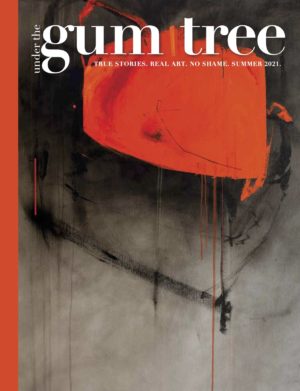Zoe W. Briscoe

Zoe Briscoe is a junior Creative Writing major at Emerson College. Her work has previously been published in UReCA: The NCHC Journal of Undergraduate Research and Creative Activity and is forthcoming in Glass Mountain. After graduating, she seeks to pursue a career in both fiction writing and academia. She currently resides in Austin, and in her spare time she can be found playing Sudoku or watching the latest figure skating competitions.
Did you feel yourself return to your inner child, whether that be while writing about yourself or another younger character, when writing this piece?
I felt myself return to my childhood while writing this piece, which was surprising. In general, younger me feels like a stranger, so when I reflect on my upbringing, I don’t generally get the choices or the thoughts she made or had. What set this piece apart was my motivation, because as I’ve grown older, it has remained clear and understandable to me. That was my way into my younger self’s head.
Which communities have you been drawn to, specifically those that you felt helped you write
this piece? How has that changed across the pandemic or through the timeline of the piece
being written?
I’m not sure if this community has a proper name, but I consider those who are involved in aesthetic endeavors/sports (like figure skating, dance, and gymnastics) as a community that helped me immensely in my creative process. In all of these fields, there’s a strict body standard that must be followed, and the struggle of maintaining such a low weight is a common problem which unifies us. Unfortunately, throughout the pandemic and my writing of this piece, this aspect of the community has largely stayed the same because the body standard has persisted. The criticism of Simone Biles and other U.S. gymnasts for being “too muscular” during the Olympics is proof enough of that.
How did this experience influence your relationship with your mother?
When I first retired from ballet and started to realize how big of an effect it had on my body image and eating habits, I think I did slightly resent my mother for it. However, over time, I’ve come to see things differently, for example: she didn’t create the incredibly thin standard that exists in ballet. And since I wanted to be a professional ballerina, I had to adhere to that standard no matter what. My mom just wanted to do everything in her power to make me succeed, and I don’t blame her for that at all.
This piece strikes me because it is such a simple moment, highlighting something people do much more than they’re willing to admit (at least from what I have heard), yet it is a contained story that says so much more. Out of all the moments you could have used to express the overarching themes of this piece, what made this the one to choose?
For me, this moment seemed like the perfect one to express these themes not because of what I did, but why I did it. Stealing because I was hungry all of the time illustrated how damaging the body standard of ballet is and how far I was willing to go to escape it. Even though I have plenty more examples of how being in ballet affected me, this one is the most powerful.

